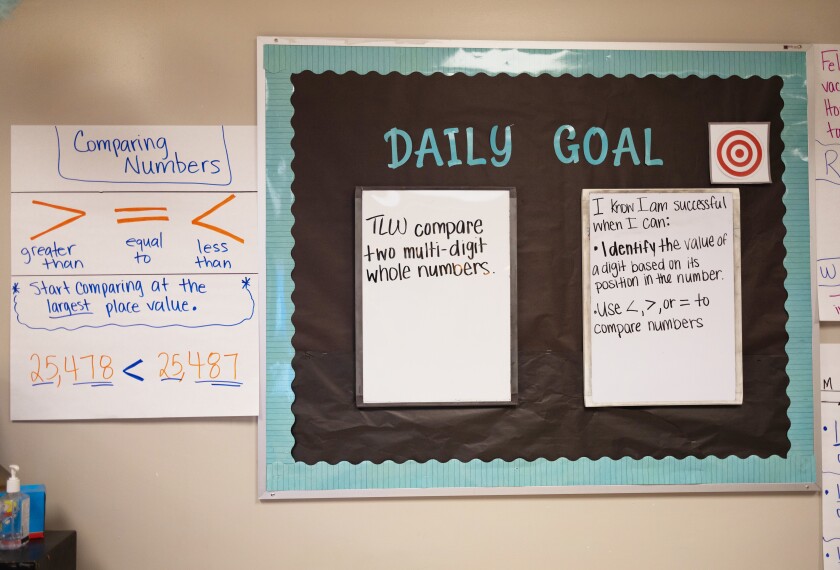The United States has a math problem, and, like most middle school students sitting down with their homework, we are not finding any easy solutions. Young people in this country are struggling to attain the proficiency necessary to pursue the careers our economy desperately needs. Universities bemoan students’ inability to complete college-level math. Each year thousands of newly admitted college students are placed in non-credit-bearing remedial courses in math, a path that immediately puts them at a higher risk of not completing a degree.
Maybe it’s the classics professor in me talking, but I approach this math problem from an unorthodox angle: Latin. In a 2011 article, “An Apology for Latin and Math,” high school Latin teacher Cheryl Lowe made a compelling comparison between the study of Latin and the study of math. Much like Latin, she observed, “math is hard because it builds so relentlessly year after year. Any skill not mastered one year will make work difficult the next.”
High school teachers have discovered that the unrelentingly cumulative nature of the study of Latin and the study of mathematics explains why students struggle to excel in either discipline.
A favorite lament of college and university faculty in quantitative fields is that students cannot perform college-level math. But what is college-level math?
In the world of classics, there is no such thing as college-level Latin. My daughter’s high school Latin teacher uses the same textbook for her class that I have used to teach Latin at Duke University, Whitman College in Washington state, and the University of Southern Maine. It turns out that there are only two differences between high school Latin and college Latin. The first is pace. I tell students that one year of college Latin is the approximate equivalent of three years of high school Latin.
The other difference is the developmental level of the student. A high school student is often not as prepared as a college student to confront demanding theoretical material, and therefore college classes might incorporate more theory than would a high school class.
The United States has been sucked into the myth of college-level math."
Like Latin, algebra is a language; and like Latin, algebra is taught to students of different developmental levels at different paces and with different levels of theoretical grounding across the K-16 landscape. The crucial difference between Latin and math education is that classicists understand that Latin is Latin, no matter the level.
Students who took Latin in high school are often encouraged to begin Latin anew when they get to college. The review students receive in an introductory college course reinforces their learning in preparation for more advanced work. This is precisely what I did when I got to college, and no one suggested that mine was not college-level study, quite the opposite: I became a classical languages major and nine years later finished a doctorate in classical studies.
In contrast, the United States has been sucked into the myth of college-level math. If students need a review of algebra, instead of encouraging them to start anew in order to reinforce their skills, we test them, label that review “remedial,” and withhold college credit from them. This message is jarring and discouraging to new college students, many of whom already have significant doubts about whether they belong in college or whether college is worth the investment.
I point out the discrepancy between our approaches to these subjects not to downplay the national crisis in quantitative reasoning but to suggest that the deficiency is in our attitude toward teaching math.
We know how to teach Latin, and we do it well. Year after year we teach the same challenging skills, facts, and concepts in different ways from middle school through college, never complaining that students are not doing college-level work. Once students have enough facility to read unabridged ancient texts, whether that happens in 8th grade or their junior year of college, we move on to translation and critical reading appropriate to the developmental level of the student.
Our approach to teaching Latin can inform better practices in math education. No one would deny that students wishing to become physicists must master calculus, but we must shift our narrative from one that labels students “deficient” on the basis of arbitrary grade-level designations. Instead, we should embrace a reverse-engineering model in which we establish clear, carefully constructed pathways to the things students must do.
Our lamentations about student deficiencies and our focus on what constitutes college-level work have been an unfortunate distraction from the salient challenge of how to help students reach the careers or paths of study to which they aspire. Meeting this challenge may require blurring the lines even further between high school and college curricula. It may require courses of different paces and configurations from the familiar K-16 standards. It will certainly require better partnerships between high schools and universities.
As is so common in the academy, we have focused on faculty-centric, content-based questions (“What constitutes college-level math?”) rather than student-centric, learning-based questions (“What do students need to reach their goals?”). Solving our math problem will require unorthodox strategies for increasing student success in math rather than trying to quantify what “counts” at the college level.




